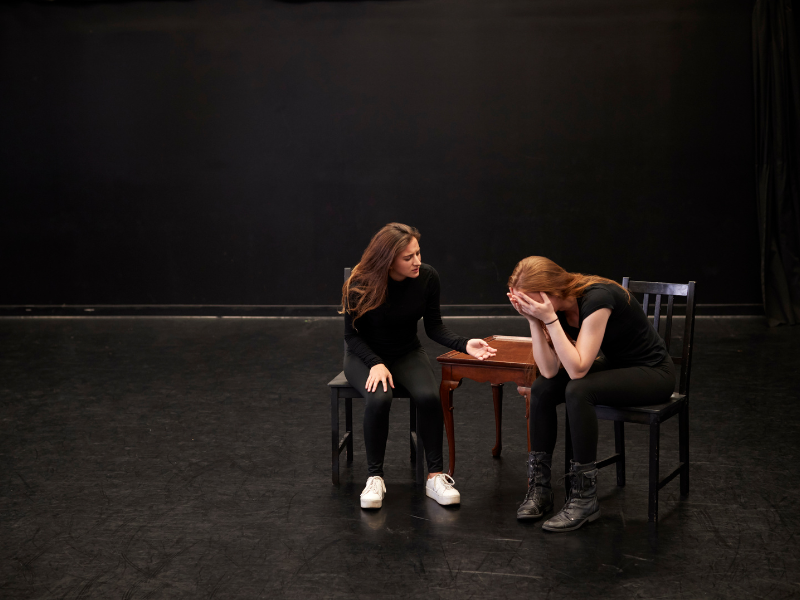Mothers who work in Scotland’s performing arts sector face significant childcare challenges, a report has found.
The study, undertaken by University of the West of Scotland (UWS) in partnership with Oxfam Scotland, has explored the impact of childcare responsibilities on mothers’ work, careers, and finances.
Report author, Dr Aleksandra Webb, Lecturer in Business and Management at UWS, said: “Childcare responsibilities are a key driver of low female participation in the labour market and are often the reason for stalling the careers of women.”
Parents in Scotland are entitled to up to 1,140 hours per year of statutory childcare, free at the point of use, for all three- and four-year-olds, and some younger children, with commitments to expand provision to all two-year-olds. However, for mothers who are performers, there are ongoing challenges in accessing childcare, with limited provision outside of normal working hours.
Performers are typically described as those whose job either fully or partly involves performing on stages, in concert halls, on radio, or in front of the camera.
The research found that for these individuals, challenges are intensified by atypical working arrangements, which often do not conform to nine-to-five working hours and are incompatible with the operating hours of standard childcare provision. This is creating an additional key barrier for these mothers in returning to work and maintaining their careers. However, research participants say this is compounded by employers being either unaware or inconsiderate of their needs.
Dr Webb said: “Childcare costs and childcare availability impact mothers the most as they still shoulder the majority of childcare responsibilities.
“Our research explored the lived experience of mothers who are performers, who face multiple access barriers to suitably flexible and affordable childcare. We also shine a light on the fragility of female artistic careers in the context of systemic difficulties with childcare availability.
“Experiences conveyed by mothers working in the performing arts and entertainment sector not only demonstrate the shortcomings of the existing childcare system, but also how little flexibility exists in the working patterns within this sector. This lack of flexibility makes it often near impossible to reconcile work with the typical operating hours of childcare provision.”
The research involved in-depth interviews with a cohort of mothers working in the performing arts and entertainment sector. Discussing the challenges, musical theatre performer, Lena, said: “When I see an audition, my first thought is worry. Can I get childcare? There are many, many, many jobs that I can’t even apply for, because I just can’t get childcare. Then once I get a job, I worry about how I can find the time to be able to practice.”
Musician Sarah said: “This industry likes to start work midway through the morning, and that makes it really tough for parents. That’s okay for office staff because they go home at 5.30pm. But if you’re a musician? I’ve tried to say this time and time again, but I’m in a minority having children.”
Singer-songwriter, Mira, added: “When I asked about flexible hours, the response was “no”. I asked if I could just do four days, but the response was “no, it’s full-time.” It was very black and white, and full-time meant you being there at ten o’clock, working straight through until the show finishes late in the evening. No lunch, no breaks. I was exhausted.”
Further findings of the research, which has been published by the UWS-Oxfam Partnership, include:
- Managing work and childcare is difficult for mothers who are performers due to irregular work patterns, often with intense schedules of long hours, frequent travel or absences from home, and unpredictable income.
- Work and the return to work after childbirth are dependent on flexible and affordable childcare.
- Existing childcare provision through nurseries is inflexible and incompatible with work patterns in the performing arts and entertainment sector.
- As nursery opening hours rarely align with the work schedules of mothers who are performers, the statutory state-funded hours of childcare do not fully benefit them.
- Many mothers who are performers ‘double pay’ for childcare. This can include paying regular nursery fees, as well as the cost of temporary childcare arrangements during periods of performing away from home, and costs for ‘childcare top-ups’ such as the childminders needed to extend childcare beyond nursery or school hours.
- Employers can be unaware or inconsiderate of mothers who are performers’ needs, and it seems as if a ‘culture of silence’ around motherhood and childcare responsibilities prevails in the sector.
- Little support is available to help mothers who are performers return to work and little support to stay in work.
- Facilities such as creches or breastfeeding rooms at workplaces are insufficient, and family-friendly workplace policies and practices are limited.
Dr Hartwig Pautz, Senior Lecturer at UWS and co-lead of the UWS-Oxfam Partnership, said: “The report demonstrates yet again that childcare is too often, and for too many, neither available nor affordable. And this is not only true for mothers who are performers.
“To a large extent, their experiences are similar to those of mothers working in other occupational contexts, with working hours which are fundamentally incompatible with the standard operating hours of childcare provision”.
Jamie Livingstone, Head of Oxfam Scotland, added: “The experiences of mothers in the performing arts sector are symptomatic of a childcare system that is all too often both unaffordable and inaccessible. Despite efforts to date, across Scotland, eye watering childcare costs are either trapping parents in poverty or leaving them on the precipice of it because they are forced to make impossible choices about looking after their children and their careers. If paid work is to provide a genuine route out of poverty, further investment in high quality, wrap around, and truly accessible childcare is essential.”
The research identifies a range of learning points for policy and practice to increase support for those working in non-typical forms of employment, including:
- Increased investment is needed to deliver universal, high-quality, wrap-around childcare, in ways that make it more affordable for parents to return to paid work and to sustain it.
- To maximise their impact, childcare solutions should be co-designed and evaluated with parents, including those working within non-standard forms of paid employment.
- Family-friendly working practices need to be promoted and championed, particularly within sectors characterised by non-standard forms of paid employment, such as the performing arts and entertainment sector.
- A new National Outcome to value and invest in care should be introduced within Scotland’s National Performance Framework and include robust National Indicators to transparently track the progress achieved to improve childcare provision nationally.
Read the full UWS-Oxfam research report here: https://www.uws.ac.uk/media/7123/report-no-13-juggling-childcare-and-work-the-challenges-facing-mothers-performers-in-scotland.pdf.
Visit the UWS-Oxfam website here: https://www.uws.ac.uk/research/uws-oxfam-partnership/.


